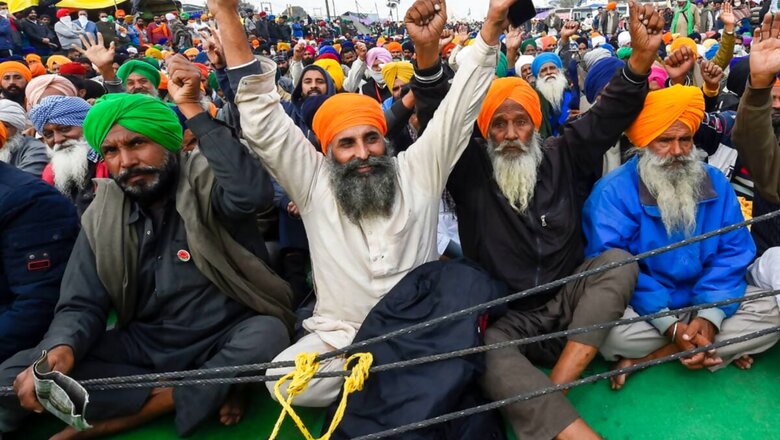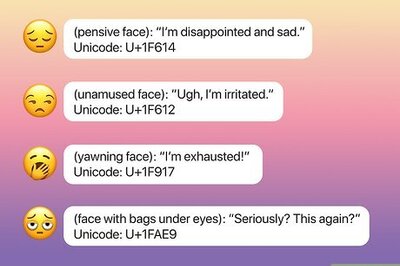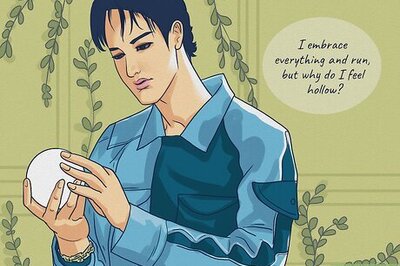
views
The ongoing farmers’ stir underlines the fear of and hatred for ‘corporates’—the awful Indianism for ‘corporations.’ For a biggest objection to the new farm laws is that big corporations will take over the marketing of agricultural produce, form a cartel, and then exploit the poor farmer. The stir also underlines another defining feature of the Indian psyche—doublethink. In his novel 1984, George Orwell described it as “the power of holding two contradictory beliefs in one’s mind simultaneously, and accepting both of them.”
Before pondering over the consequences of doublethink, let’s see a few glaring examples. One reason that many apolitical common people sympathise with the farmers’ agitation is that they believe that big corporations are bad. This is the consequence of the decades of indoctrination of socialist principles—shibboleths, actually—in our schools and colleges. Thanks to the exertions of academics and intellectuals, who are often pinkish, the lies of socialism have acquired a verisimilitude of veracity, the biggest of them is: corporations exploit the poor, and now they will fleece farmers.
So, everybody—from the agitating farmers and opposition leaders to sports and film stars and wannabe celebrities—is blabbering against the farm laws, though they are the best thing that has happened in agriculture since Independence. Public discourse and folklore in India are generally against corporations. Our intellectuals never tire railing against big ‘corporates.’ We are told that these companies exploit their employees, bribe politicians and bureaucrats, break or mould rules and regulations, evade taxes, and don’t care a hoot about the environment.
Yet, if you ask anybody, intellectual or otherwise, if they would like to work with a big company—or if they want their children to be employed by it—the answer would be a big ‘yes.’ For everybody knows that big companies pay well, have a better working atmosphere, and are not run by the whims and fancies of small, proprietary firms—at least, at the lower and middle levels. They are happy working with big companies.
But when it comes to public policy, everybody says that corporations are ruthless exploiters. What is good for me, however, is not good for the country, the economy, certainly not for the farmer.
Similarly, the sanskaris believe and claim that Ayurveda is the basis of the world’s best medicine system. But when it comes to personal choices, they want their children to become allopathic doctors with MBBS, MS, MD degrees. They don’t want their kids to become Ayurvedic doctors.
Also, India is the greatest country in the world in which even the gods yearn to be born in, the sanskaris assert. But they themselves go to America, the UK, and other western countries for medical treatment; they also migrate to these countries. For the higher education of their children too, these are the preferred countries. It is, however, with considerable pride that they flaunt the green card and permanent residency of their sons and daughters.
It needs to be mentioned here that the sanskaris have no monopoly over doublethink; leftists give them a tough challenge. They acquire anti-western postures and doctrines while studying—and the brighter ones go to western universities to write theses on the everlasting curse of British imperialism. How many fellow travellers have settled in egalitarian paradises as China, North Korea, and Cuba?
Doublethink is different from, and infinitely worse than, hypocrisy. Orwell wrote: “To know and not to know, to be conscious of complete truthfulness while telling carefully constructed lies, to hold simultaneously two opinions which cancelled out, knowing them to be contradictory and believing in both of them, to use logic against logic, to repudiate morality while laying claim to it, to believe that democracy was impossible and that the Party was the guardian of democracy…”
To believe that the corporate sector exploits us and to aspire for a job in a big company; to claim that India is the greatest country in the world and try for permanent residency in Canada; to assert that the West is decadent and seek jobs in America and Europe. Isn’t doublethink wonderful?
Doublethink is more dangerous than hypocrisy, for the hypocrite at some point of time may feel a prick of conscience. The scotch-loving activist campaigning for prohibition may—just may—feel bad about his hypocrisy. The reason is that he has not completely anesthetised himself from the reality, nor has be stopped thinking. But a doublethinker has. For doublethink results in nothink: by simultaneously holding contradictory beliefs we cancel out both. The sum of X and –X is zero: what is mathematically true is also logically correct.
The doublethinker is protected from both a guilty conscience and the objective reality.
It is distressing to note that while in Orwell’s dystopia doublethink is officially promoted, in India it is prevalent without coercion. The result is that we have become an unthinking nation, which is reactive rather than proactive. Things happen to us, and then we react—sometimes, meaningfully as in 1991 to the economic crisis, but mostly chaotically as to the stubble burning in north India, monsoons in Mumbai, and the coronavirus pandemic.
Nothink generates sentimentalism, boosts sanctimony, and encourages policy confusion. The messy, regressive farmers’ agitation is an example.
Read all the Latest News, Breaking News and Coronavirus News here




















Comments
0 comment